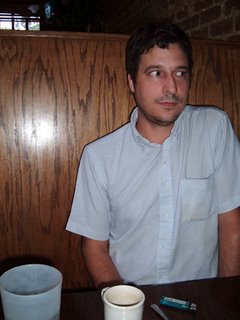 Silver From the Silt
Silver From the Silt With Tenement Halls, Chris Lopez polishes a muddy legacy
By Chad Radford Sitting rigidly against the earth-toned wooden booth at the Little 5 Points Corner Tavern, transferring ice cubes with a fork from his water to a cup of black coffee, Chris Lopez seems on edge. The reluctant local music fixture and founder of the Rock*A*Teens has long-radiated a modest and artistically frazzled presence in his songs. With his latest embodiment, Tenement Halls, Lopez has assembled a flourishing solo record,
Knitting Needles & Bicycle Bells that lifts the murky veil to reveal a humbly brilliant songwriter hiding beneath the sonic haze.
Marrying the mysterious elements of Joy Division and Jan and Dean with a cloud of reverb-drenched heartbreak, the Rock*A*Teens’ sound reached beyond Atlanta’s perimeter landing the group on indie bastion Merge Records. But instead of blowing up the group went bust after a 7-year legacy, churning out equally as many recordings. Despite being on a roster with such revered indie luminaries as Superchunk, Neutral Milk Hotel and the Magnetic Fields, the group remained a critical darling but never engaged the buying public.
Lopez cut his teeth in the post-Nirvana ‘90s, a time when bands like Pavement, Sebadoh and Guided by Voice displayed intense work ethics, while embracing willful obscurity. Does he feel pressure from this mythos? “Who’s to say what success is in that respect?” he quips. “Bands were being judged by a standard of if you came close to Nirvana you were successful. The Pearl Jams and the Soundgardens, the stuff that was on the radio was all lunkhead music anyway,” he continues. “I don’t think of Sebadoh or Pavement as obscure, but the difference between them and me is that this is not willful obscurity, this
is obscurity.”
For Lopez the group’s place in history is fine with him. “I certainly don’t take myself too seriously,” he confesses. “I’m confident with the songs I write, but not with the showmanship side of being a musician. The Rock*A*Teens came to a point where the group was serving the ego. When we played shows I wondered, was I supposed to be trying to impress people and let them judge me, even though they don’t even know me?” he continues. “Speaking for myself, I never possessed the ability or desire to be a dancing monkey. I just wanted to play music and leave it at that.”
Since the late ‘80s Lopez has played guitar for once lauded locals Dirt, Seersucker and the Opal Foxx Quartet, but it wasn’t until forging the Rock*A*Teens that his talents became apparent. Beginning with the group’s self-titled debut in ’96, leading up to its definitive 1999 offering,
Golden Time the rag-tag outfit drove its songs through a din of lo-fi muck. Echoing reverb and distortions that occur naturally when signals bang into each other on their journey from the guitar to the amp became the Rock*A*Teens calling card. Lopez’s distressed vocal wails complimented the gritty tonal qualities of the music with an uncanny resonance.
With Tenement Halls, the fog has lifted, but the recording is hardly squeaky clean. “Now She Knows” and “My Wicked Wicked Ways” are classic Lopez numbers that could have appeared on any Rock*A*Teens disc, and “Marry Me” utilizes a wavering tape-distortion as a key melodic instrument.
What’s most noticeable is Lopez’s enhanced lyrical strength. His bucolic mannerisms and stylish narratives have long been selling points for his songs. “Charlemagne” falls somewhere between the Beatles and Siouxsie and the Banshees respective takes on “Dear Prudence.” “Marry Me” sounds suspiciously like a disguised serenade to his wife, Touch&Go recording artist Shannon Wright. “Silver from the Silt” and “Starless Night” thunder with a passion for language that’s not often associated with the average rock band.
Though he quickly dismisses the influences of luxuriant Southern authors, such as William Faulkner or Flannery O’Connor, the comparisons are unavoidable. He defers to another Southern voice, that of Walker Percy. Averting book titles, like
The Second Coming and
Love in the Ruins; he pauses before offering his assessment of Percy’s style. “It’s a self-deprecating kind of loneliness, but more in an existential way; always looking at things and getting the scenarios,” Lopez expounds. “His characters are more urbane. They live in big cities and his writing is funny but it’s not gory, like Flannery O’Connor. It’s not phantasmagoric – if that’s a real word.”
Lopez also produced and played all of the instruments throughout Knitting Needles & Bicycle Bells; with few exceptions. Former Rock*A*Teen Ballard Lesemann and Will Fratesi (Cat power, Hubcap City) played drums on a few tracks while Wright played a Wurlitzer elsewhere.
For playing live Lopez has assembled a line-up consisting of Fratesi playing drums, Fran Capitanelli (Tom Collins) playing bass and Rock*A*Teen alum Jeff Wiggins playing guitar and keyboards. “[Touring] can be a real drag, but I’ll do it,” he adds. Lifting his gaze Lopez scans the dining room and reflects, “The first time I ever played live was in this very room, with the Opal Foxx Quartet back when this place was the L5P Pub. That was an entire lifetime ago. It was all a lark, but it was a lot of fun back then when I had no idea what I was doing.”
Published by
Creative Loafing (August 17, 2005). Re-edited by Chad Radford





